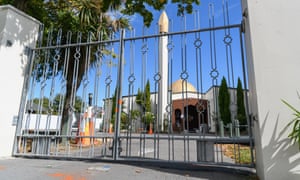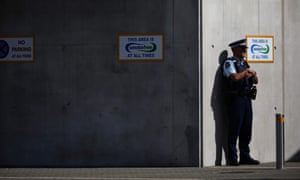
[ad_1]
In a high security and physically distanced courtroom on Monday will begin an end, of sorts, to one of the darkest and most traumatic moments in New Zealand’s history: the day an Australian terrorist stormed two mosques in the city of Christchurch, killing dozens of worshipers at prayer.
The shooting survivors and families bereaved by the gunman, will face him in Christchurch high court – many for the first time – as he is sentenced for 51 murders, 40 counts of attempted murder, and a charge of engaging in a terrorist act on 15 March 2019, all of which he has admitted.
Brenton Tarrant, a self-professed white supremacist who broadcast part of the massacre live on Facebook, faces the possibility of being the first offender in New Zealand sentenced to life in prison without the chance of ever leaving jail. After electing to represent himself, the gunman will have the opportunity to speak in court during a hearing that could present questions for the judge, and reporters, about whether any views he promotes should be suppressed or censored.
The mosque attacks were the largest mass shooting in New Zealand’s history and the first act of terrorism in decades, prompting an outpouring of grief in the normally peaceful nation, and exhortations from many in the Muslim community for the country – and its leaders – to confront what they said had been a rising tide of white supremacist threats.
Tarrant’s abrupt guilty plea in March to all the charges he faced reversed an earlier decision to plead not guilty. It also subverted plans for a lengthy trial scheduled to begin in June that some of his victims welcomed, but many were dreading.
Instead, over four days next week, more than 60 of those wounded or bereaved in the attacks, and those who witnessed them, will read statements in court about the effect of the gunman’s actions on their lives. It will be the first time since Tarrant’s first judicial appearance – the day after the 2019 shooting – that he is present in person, rather than on a video link from jail in Auckland.

Among those making statements will be Aya al-Umari, whose brother Hussein al-Umari, 35, was killed trying to protect others at al Noor mosque. She would begin by speaking about her brother’s dreams and aspirations, she said, before explaining how the attack has affected her.
“There’s only one line that I plan to eyeball him in,” al-Umari said, referring to the gunman. “When I say that I used to talk to Hussein and vent to him, and I still have the urge to pick up the phone and call him … but now that you’ve killed him you’ve actually made me turn to God and that’s made my faith in Islam even stronger.”
Justice Cameron Mander will then hear from the prosecution, and from Tarrant, about any factors they believe the presiding judge should take into account.
New Zealand’s courts issue an automatic life sentence for murder, but judges have always allowed for an offender to seek parole after a set number of years, which varies by case. No one has ever been sentenced to life without parole; the longest previous sentence was a minimum term of 30 years for a man who killed three people in 2001.
“If anything, this should be where [a sentence of life without parole] needs to be utilised,” al-Umari said.
Brenda Midson, a senior law lecturer at the University of Waikato, said the use of such a sentence must pass “a really high threshold” and take into account all factors surrounding the attacks including Tarrant’s age, the length of time he is likely to spend in jail, and his admission of the crimes – which usually results in a shorter prison term. The vulnerability of his victims as they worshipped during Friday prayers would also be considered.
Courts were reluctant to send people to jail without the chance of release, she said, and worked on the principle that “the least restrictive sentence that is necessary in all of the circumstances should be given.”
“But if there was ever a case [for that sentence], it would be this one,” she added.

The prospect of the gunman using his trial as a platform to promulgate his views has provoked anxiety among his victims; Justice Mander has suggested in a memo to news outlets ahead of the sentencing that he will, if needed, bar the reporting of “harmful material” or prevent the court process from being used for “ulterior purposes”.
The judge “can’t deny him the opportunity to speak, but he’ll pounce on him if it looks like he’s using it as an opportunity to grandstand,” Chris Gallavin, a law professor at Massey University, told the Guardian in July. He said the court would not allow Anders Behring Breivik’s hour-long statement at his 2012 trial after he killed 77 people in Norway – and would pause the hearing if it “got out of control”.
The hearing will also be the first time an official account of Tarrant’s actions is given publicly. The gunman had moved to New Zealand from Australia and amassed a cache of semi-automatic weapons before committing the attacks.
There will be an “increased and highly visible presence” of police officers in Christchurch during the hearing – particularly around the courthouse – said police spokesman John Price. The bolstered security will include vehicle barriers on the streets outside the court.
[ad_2]
Source link